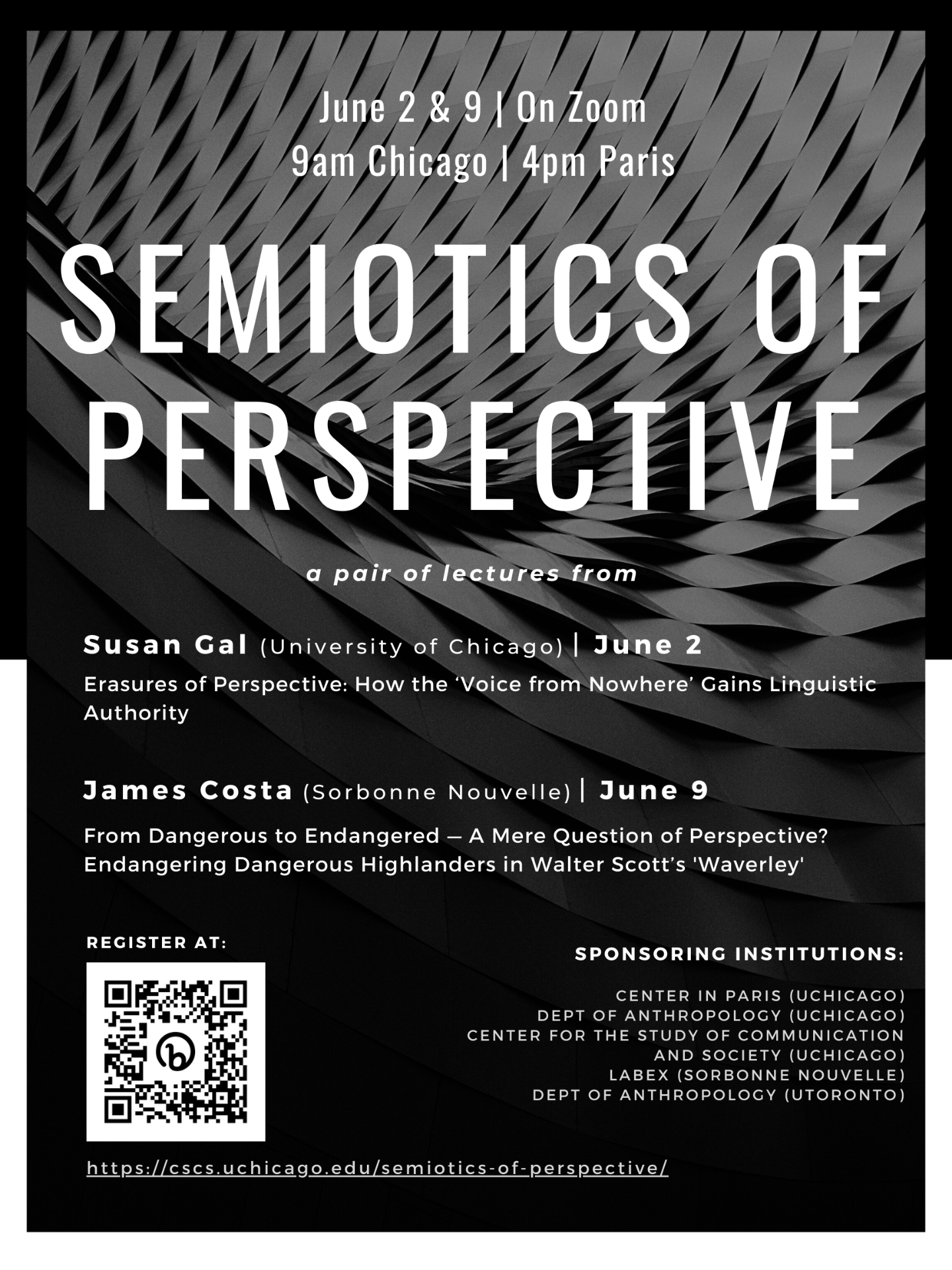Semiotics of Perspective: a pair of lectures from the
Perspective: Vision, Discourse, Ideology working group

*** Click here to register for the Semiotics of Perspective lectures ***
Friday, June 2, 2023 (9am Chicago | 4pm Paris)
Susan Gal (The University of Chicago)
Erasures of Perspective: How the ‘Voice from Nowhere’ Gains Linguistic Authority
Abstract: The terms “perspective” and “point of view” remind us that human vision is directional and limited. Thomas Nagel’s title The View from Nowhere captures the impossible desire to escape those limits in accord with the ideology of objectivity in 19th to 21st c. philosophy of science. “View” is important in that title, but “nowhere” is more so: the desired yet impossible escape from social situatedness. What if we define perspective not visually but as a range of discursive voices that biographical persons have access to and typically take up? Voicings reveal different aspects of “perspective” than vision alone. I suggest that the erasure – or the attempt at erasure – of a text’s social voice, can make it seem “objective,” free of interestedness, of “bias.” Claims to authority-as-objectivity are as important in everyday life as in philosophy of science. How are such voicings communicatively created? How do they entail whole worlds of people types, text types and social relations? In this lecture, I discuss interactional practices in an Austrian town that exemplify how erasure – and comparison of voices – achieves linguistic authority in arguments among kin; in direction-giving to locals and strangers; and in “graftings” of opposing opinions in political advertising.
Friday, June 9, 2023 (9am Chicago | 4pm Paris)
James Costa (Sorbonne Nouvelle)
From Dangerous to Endangered — A Mere Question of Perspective? Endangering Dangerous Highlanders in Walter Scott’s Waverley
Abstract: The most commonly accepted categories linguists and anthropologists use for analysis are often also an effect of perspective. In this lecture, I wish to show that “endangerment”, now often accepted in our disciplines as fact, was constructed through a perspectival change, one that took place within the space that R. M. Trouillot called “the savage slot”. Based on an analysis of Walter Scott’s Waverley (1814), I show how Western perspective on the Savage slot shifted from fear to curiosity, from seeing those occupying that slot as dangerous to endangered. This shift in turn allowed for an apparently aperspectival approach to develop in salvage anthropology and documentary linguistics. Scott performed this work on Highlanders in a novel that was key to transforming the Highlands and making them fit for Romanticism in the 19th and 20th centuries. His novel later served as a model for other such changes of perspective, in particular Cooper’s (1826) The Last of the Mohicans for example.
About the Semiotics of Perspective lectures: These two lectures are part of a larger project, Perspective: Vision, Discourse, Ideology, comprising linguistic anthropologists, sociolinguists, and semioticians in Paris, Toronto, and Chicago focused on the question of perspective. Perspective has featured as a central analytic object in fields as diverse as art history, film studies, and literary studies to the philosophy of science, phenomenology, feminist criticism, and the anthropology of ethics. It has also emerged as a key concept within linguistic anthropology and sociolinguistics to understand the situated, political, and relativistic nature of discursive action. Thinking across questions vision and visibility; voicing and translation; and ideology and worlding, this project — consisting of a year-long reading group (AY 2022–2023); this lecture series (June 2, 9); and an intensive three-day workshop (June 19–21, 2023) — is devoted to articulating an ethnographically situated account of the semiotics of perspective in social life. Perspective: Vision, Discourse, Ideology is supported by the University of Chicago’s Paris Center, the University of Chicago’s Department of Anthropology, The Center for the Study of Communication and Society (University of Chicago), LabEx (Sorbonne Nouvelle), and the University of Toronto’s Department of Anthropology.
